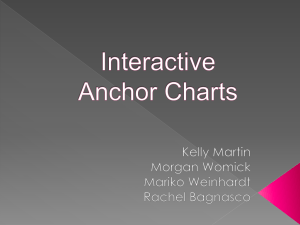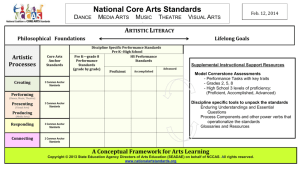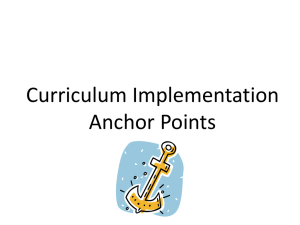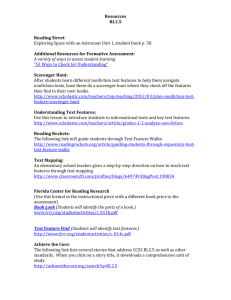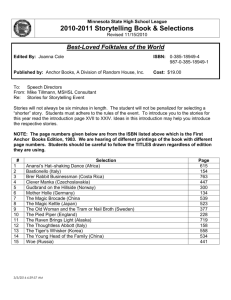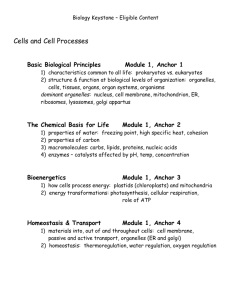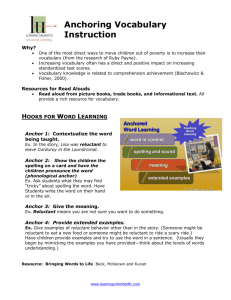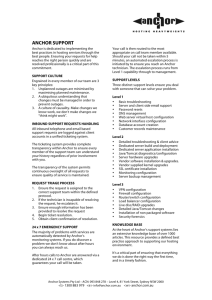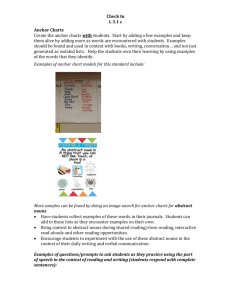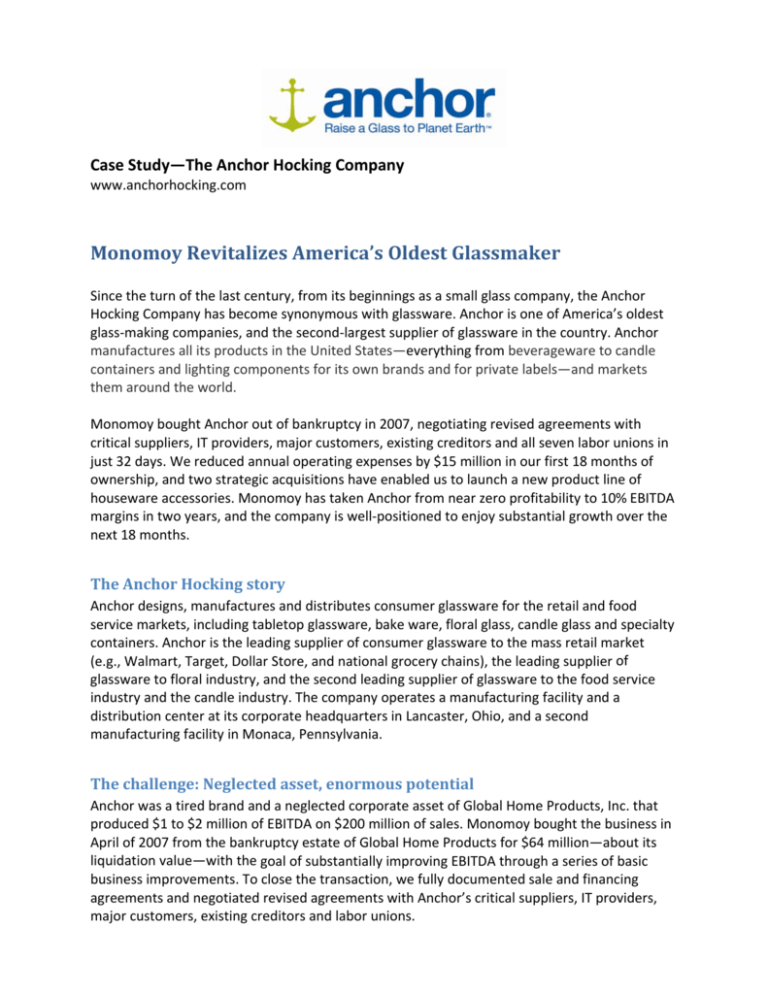
Case Study—The Anchor Hocking Company www.anchorhocking.com Monomoy Revitalizes America’s Oldest Glassmaker Since the turn of the last century, from its beginnings as a small glass company, the Anchor Hocking Company has become synonymous with glassware. Anchor is one of America’s oldest glass‐making companies, and the second‐largest supplier of glassware in the country. Anchor manufactures all its products in the United States—everything from beverageware to candle containers and lighting components for its own brands and for private labels—and markets them around the world. Monomoy bought Anchor out of bankruptcy in 2007, negotiating revised agreements with critical suppliers, IT providers, major customers, existing creditors and all seven labor unions in just 32 days. We reduced annual operating expenses by $15 million in our first 18 months of ownership, and two strategic acquisitions have enabled us to launch a new product line of houseware accessories. Monomoy has taken Anchor from near zero profitability to 10% EBITDA margins in two years, and the company is well‐positioned to enjoy substantial growth over the next 18 months. The Anchor Hocking story Anchor designs, manufactures and distributes consumer glassware for the retail and food service markets, including tabletop glassware, bake ware, floral glass, candle glass and specialty containers. Anchor is the leading supplier of consumer glassware to the mass retail market (e.g., Walmart, Target, Dollar Store, and national grocery chains), the leading supplier of glassware to floral industry, and the second leading supplier of glassware to the food service industry and the candle industry. The company operates a manufacturing facility and a distribution center at its corporate headquarters in Lancaster, Ohio, and a second manufacturing facility in Monaca, Pennsylvania. The challenge: Neglected asset, enormous potential Anchor was a tired brand and a neglected corporate asset of Global Home Products, Inc. that produced $1 to $2 million of EBITDA on $200 million of sales. Monomoy bought the business in April of 2007 from the bankruptcy estate of Global Home Products for $64 million—about its liquidation value—with the goal of substantially improving EBITDA through a series of basic business improvements. To close the transaction, we fully documented sale and financing agreements and negotiated revised agreements with Anchor’s critical suppliers, IT providers, major customers, existing creditors and labor unions. In November 2007, we acquired Indiana Glass, a $60 million glassware division of Lancaster Colony Corp., and integrated Indiana Glass’ manufacturing operations into Anchor’s existing facilities. In November of 2008, Anchor acquired Alco Consumer Products, Inc., a $30 million distributor of imported houseware products to the mass retail channel. With the two acquisitions, we expect Anchor to produce substantial EBITDA on $280 to $300 million in sales by 2010. We bought Anchor for a few key reasons: It’s a business that deserves to exist. There is a limited amount of glassmaking capacity in North America; there are high capital costs to enter the market; and it is very difficult to import retail glassware from Asia—glass is heavy and it breaks on the water. Anchor is also a critical supplier to important companies such as Walmart and Target. This is the sort of sticky or important company we like to own. It had problems we could identify and fix. Anchor ran a 1940s management operating system that ensured high operating costs and modest profitability. We believed the Monomoy operating team could reduce basic operating costs at Anchor by $12 to $16 million in a matter of months by renegotiating labor and IT contracts, improving basic shop floor productivity and staffing, consolidating vendors and rebidding supply contracts, reducing energy usage, rationalizing overhead costs and improving product mix. These are all familiar challenges that we’ve successfully addressed, over and over, in Monomoy investments. It presented an opportunity to create significant value. At a reasonable purchase price, we could create value for both Anchor and Monomoy’s investors, without assuming sales growth and without putting too much debt on the businesses, by improving basic business practices over the first 12 to 24 months of Monomoy ownership. In addition, once we helped make Anchor profitable, we were able to drive tremendous growth and upside for the company through a series of strategic acquisitions that extended Anchor’s reach in the houseware segment. Improving the business: a culture struggle Over the first 18 months of Monomoy ownership, we worked with Anchor’s management team to implement a dozen business improvement programs that reduced Anchor’s annual operating expenses by over $15 million. We focused our initial restructuring efforts on rebuilding the manufacturing operating system (a $2 million, six‐month project that eliminated $6 million of annual expense), re‐sourcing the entire discretionary vendor base (a $1 million project that saved $3 million in supply chain costs), implementing over $3 million of improvements in revised labor and vendor contracts and reducing the company’s product offering (or “SKU count”) by over 25%. 2
These are not easy changes to make in any business, and they were especially challenging in light of Anchor’s proud manufacturing culture. Management initially doubted that some of the Monomoy projects would work, and Anchor suffered as many setbacks as victories in the first few months of Monomoy ownership. However, both management and the workforce came to believe that the Monomoy system would restore Anchor to long‐term prosperity. With the help of Monomoy operating professionals, Anchor accomplished its initial business improvement goals in a little over a year, transforming a struggling manufacturing unit into a profitable, entrepreneurial business. Identifying areas for growth As we stabilized Anchor through 2007 and into 2008, we identified several areas of potential expansion for Anchor in a mature houseware market. In November 2007, we acquired Indiana Glass and E.O. Brody (a floral distributor) from Lancaster Colony Corp. with a program to consolidate the two Indiana Glass plants into existing Anchor facilities. In February of 2008, we sold E.O. Brody to an Anchor customer for $14 million. Indiana Glass should add approximately $50 million of revenue and substantial EBITDA to the Anchor platform. The company consolidated Indiana Glass facilities into Anchor between May and November of 2008, in the process becoming the largest supplier of floral glassware in North America. In November of 2008, we acquired the assets of Alco Consumer Products, a distributor of non‐
glass housewares to Walmart and Anchor’s other mass retail customers, for $5 million. We will re‐launch the Alco line as Anchor Home Collections in late 2009 with the expectation of adding $30 million of sales to Anchor in 2010. This is a characteristic progression for a Monomoy company. We buy good businesses and we make them better. Once we help create a cost structure and corporate culture that supports profitability, our businesses are well‐positioned to grow organically and acquire weaker competitors. With the Indiana Glass and Alco acquisitions, Anchor will grow by well over 50% under Monomoy ownership—despite the current economic recession. Finding success beyond the recession No business is immune to the economic collapse that we have witnessed in the current business cycle, and Anchor’s sales declined substantially with falling consumer demand in 2008 and 2009. For Monomoy, however, an economic recession—even the sharpest decline in consumer spending since the Great Depression—is simply another business challenge to overcome and another opportunity to improve. At Anchor, we worked with management to implement an urgent recovery program in late 2008 focused on further improvements in manufacturing, supply chain savings and overhead rationalization. The program has worked and has allowed Anchor to increase EBITDA substantially despite reduced sales. As a result, Anchor will enjoy its best year under Monomoy ownership in 2009. At this point, we have put in place our essential business improvement programs at Anchor and substantially enhanced its asset base, product mix and basic profitability. We have helped take 3
Anchor from essentially zero profitability to 10% EBITDA margins or better in two years, despite a recession‐driven sales decline. Along the way, we have paid down debt, helped revitalize an iconic American brand, and greatly extended Anchor’s reach into the houseware market. As long as Anchor continues to execute on the factory floor, sales and profits should grow substantially over the next two years as the economy stabilizes and the company continues to migrate into higher‐margin glassware products. About Monomoy Monomoy Capital Partners, L.P., is a leading private investment firm focused on constructive investing in middle market companies facing special situations. We target good businesses with annual sales of between $40 and $300 million, and implement customized business improvement programs that reduce operating expenses, increase profitability and encourage meaningful growth. In 2009, Monomoy companies will generate more than $1.4 billion in combined sales, employ over 9,000 team members and operate approximately 42 facilities in North America, Europe, India, Brazil and China. © 2009 Monomoy Capital Partners, L.P. All rights reserved. 4

